Business Law Report: Analysis of Sales, Credit, and Agency Issues
VerifiedAdded on 2020/02/12
|20
|4743
|80
Report
AI Summary
This business law report analyzes a case involving a car purchase, focusing on legal rules of implied terms, statutory provisions on transfer of property, and buyer/seller remedies within sales of goods contracts. It also addresses product liability for faulty goods. The report further explores different types of credit card agreements, legal rules on termination rights and default notices, and the features of agency, differentiating between various types of agents. The report examines the rights and duties of an agent, providing a comprehensive overview of consumer credit and agency law. The report covers key areas like sales of goods, consumer credit, and agency law, offering insights into Ben's case and relevant legal principles. It also analyzes termination rights, default notices, and the features of agency, providing a comprehensive overview of the legal aspects of Ben's situation.
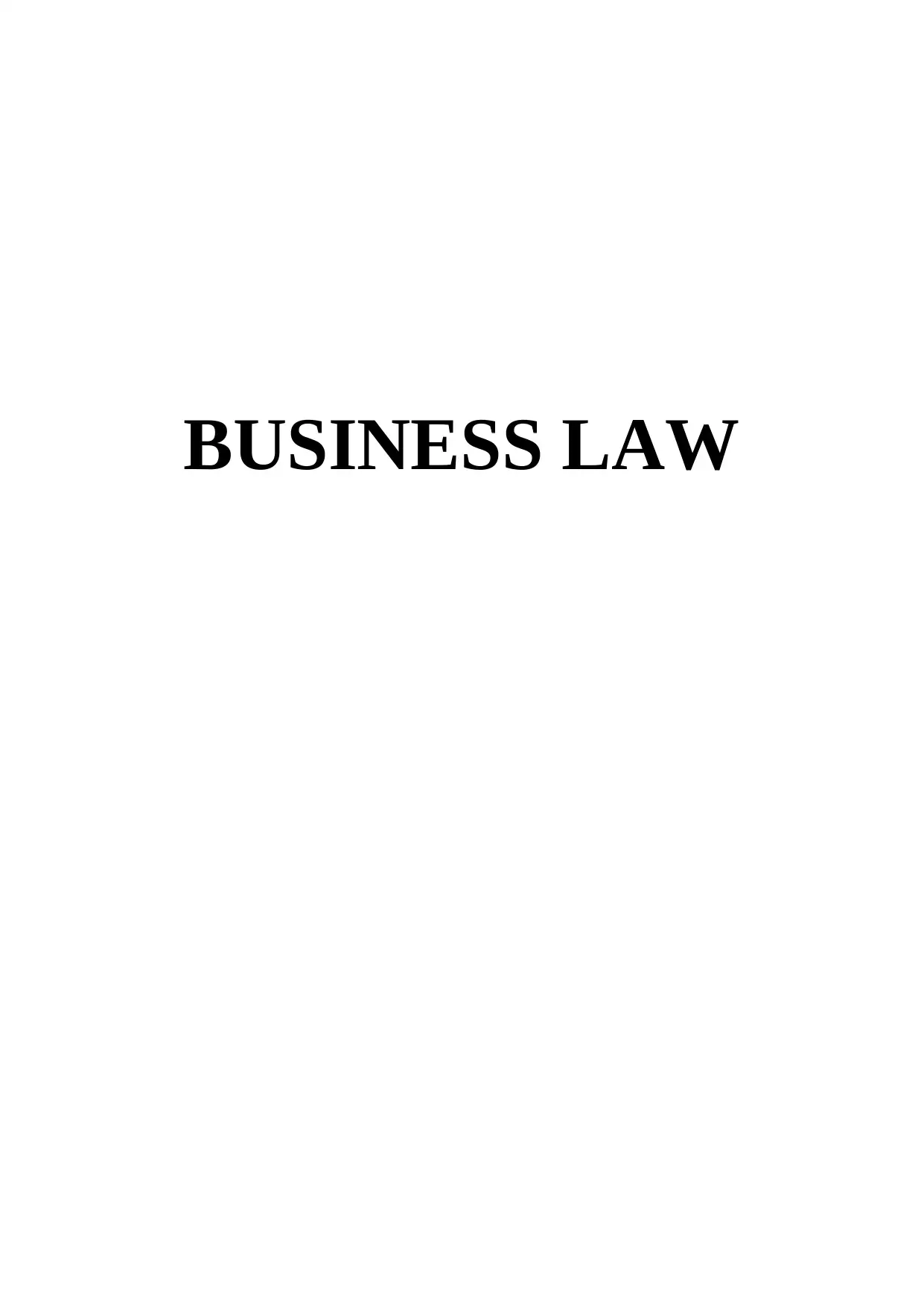
BUSINESS LAW
Paraphrase This Document
Need a fresh take? Get an instant paraphrase of this document with our AI Paraphraser
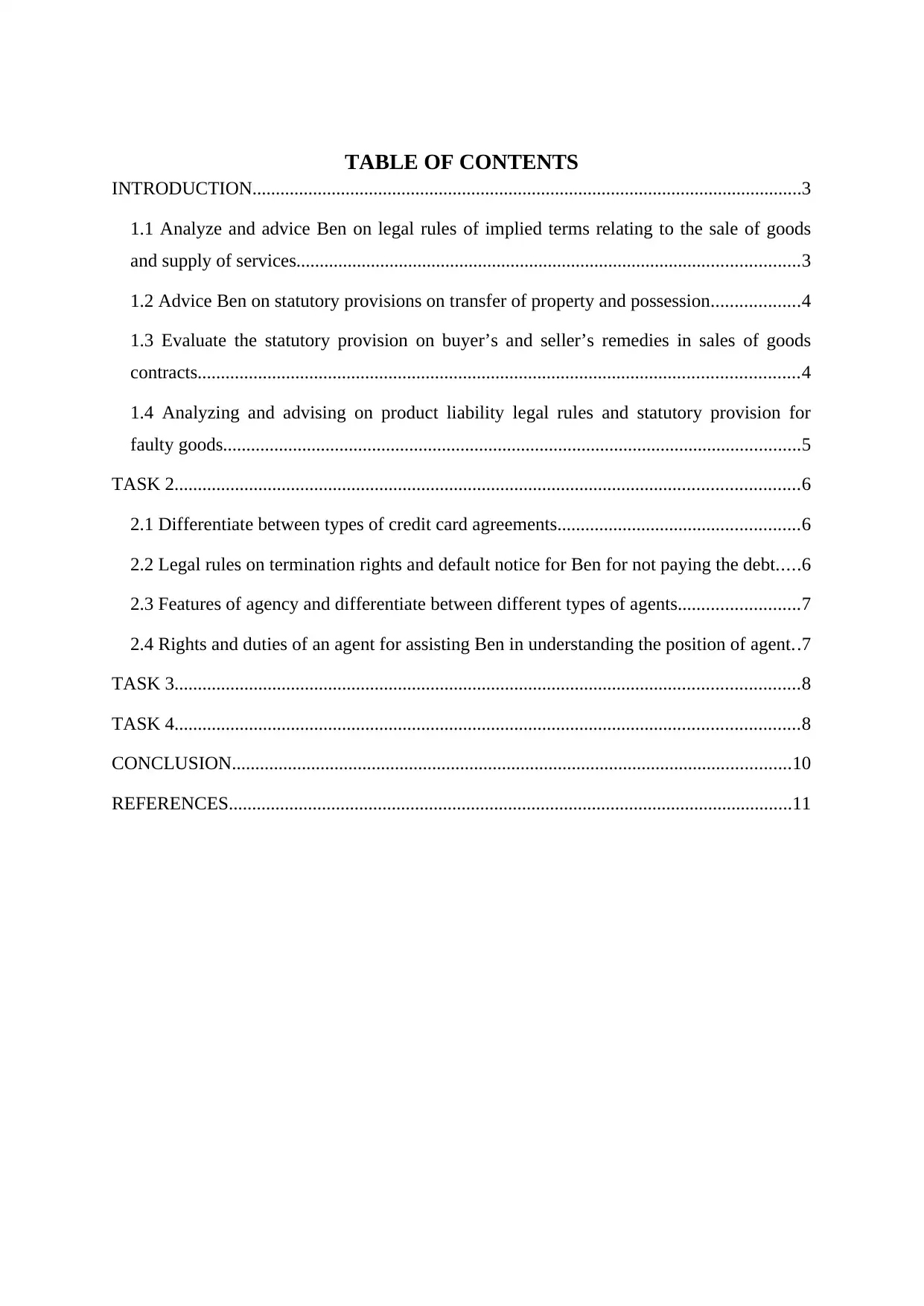
TABLE OF CONTENTS
INTRODUCTION......................................................................................................................3
1.1 Analyze and advice Ben on legal rules of implied terms relating to the sale of goods
and supply of services............................................................................................................3
1.2 Advice Ben on statutory provisions on transfer of property and possession...................4
1.3 Evaluate the statutory provision on buyer’s and seller’s remedies in sales of goods
contracts.................................................................................................................................4
1.4 Analyzing and advising on product liability legal rules and statutory provision for
faulty goods............................................................................................................................5
TASK 2......................................................................................................................................6
2.1 Differentiate between types of credit card agreements....................................................6
2.2 Legal rules on termination rights and default notice for Ben for not paying the debt.....6
2.3 Features of agency and differentiate between different types of agents..........................7
2.4 Rights and duties of an agent for assisting Ben in understanding the position of agent..7
TASK 3......................................................................................................................................8
TASK 4......................................................................................................................................8
CONCLUSION........................................................................................................................10
REFERENCES.........................................................................................................................11
INTRODUCTION......................................................................................................................3
1.1 Analyze and advice Ben on legal rules of implied terms relating to the sale of goods
and supply of services............................................................................................................3
1.2 Advice Ben on statutory provisions on transfer of property and possession...................4
1.3 Evaluate the statutory provision on buyer’s and seller’s remedies in sales of goods
contracts.................................................................................................................................4
1.4 Analyzing and advising on product liability legal rules and statutory provision for
faulty goods............................................................................................................................5
TASK 2......................................................................................................................................6
2.1 Differentiate between types of credit card agreements....................................................6
2.2 Legal rules on termination rights and default notice for Ben for not paying the debt.....6
2.3 Features of agency and differentiate between different types of agents..........................7
2.4 Rights and duties of an agent for assisting Ben in understanding the position of agent..7
TASK 3......................................................................................................................................8
TASK 4......................................................................................................................................8
CONCLUSION........................................................................................................................10
REFERENCES.........................................................................................................................11
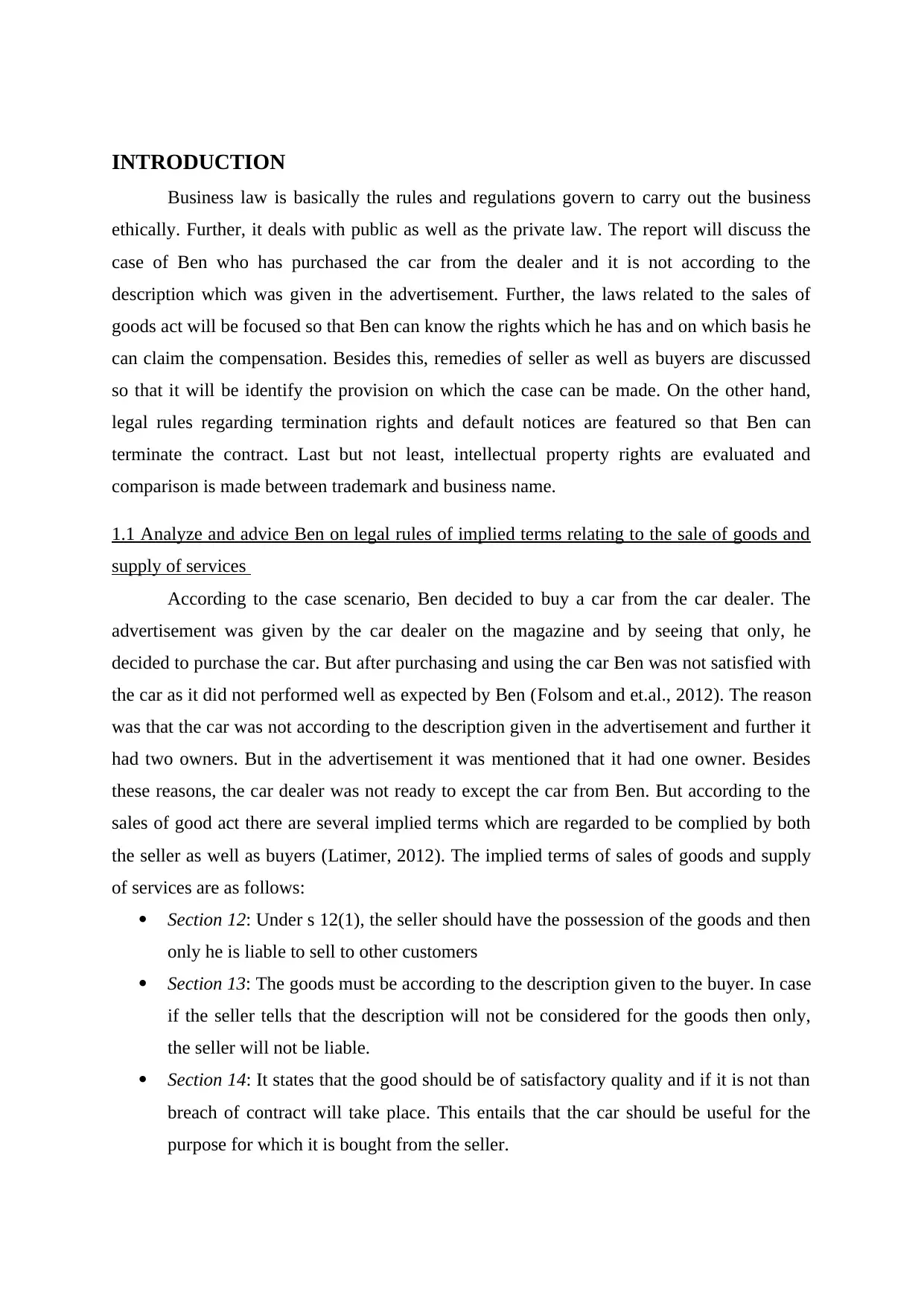
INTRODUCTION
Business law is basically the rules and regulations govern to carry out the business
ethically. Further, it deals with public as well as the private law. The report will discuss the
case of Ben who has purchased the car from the dealer and it is not according to the
description which was given in the advertisement. Further, the laws related to the sales of
goods act will be focused so that Ben can know the rights which he has and on which basis he
can claim the compensation. Besides this, remedies of seller as well as buyers are discussed
so that it will be identify the provision on which the case can be made. On the other hand,
legal rules regarding termination rights and default notices are featured so that Ben can
terminate the contract. Last but not least, intellectual property rights are evaluated and
comparison is made between trademark and business name.
1.1 Analyze and advice Ben on legal rules of implied terms relating to the sale of goods and
supply of services
According to the case scenario, Ben decided to buy a car from the car dealer. The
advertisement was given by the car dealer on the magazine and by seeing that only, he
decided to purchase the car. But after purchasing and using the car Ben was not satisfied with
the car as it did not performed well as expected by Ben (Folsom and et.al., 2012). The reason
was that the car was not according to the description given in the advertisement and further it
had two owners. But in the advertisement it was mentioned that it had one owner. Besides
these reasons, the car dealer was not ready to except the car from Ben. But according to the
sales of good act there are several implied terms which are regarded to be complied by both
the seller as well as buyers (Latimer, 2012). The implied terms of sales of goods and supply
of services are as follows:
Section 12: Under s 12(1), the seller should have the possession of the goods and then
only he is liable to sell to other customers
Section 13: The goods must be according to the description given to the buyer. In case
if the seller tells that the description will not be considered for the goods then only,
the seller will not be liable.
Section 14: It states that the good should be of satisfactory quality and if it is not than
breach of contract will take place. This entails that the car should be useful for the
purpose for which it is bought from the seller.
Business law is basically the rules and regulations govern to carry out the business
ethically. Further, it deals with public as well as the private law. The report will discuss the
case of Ben who has purchased the car from the dealer and it is not according to the
description which was given in the advertisement. Further, the laws related to the sales of
goods act will be focused so that Ben can know the rights which he has and on which basis he
can claim the compensation. Besides this, remedies of seller as well as buyers are discussed
so that it will be identify the provision on which the case can be made. On the other hand,
legal rules regarding termination rights and default notices are featured so that Ben can
terminate the contract. Last but not least, intellectual property rights are evaluated and
comparison is made between trademark and business name.
1.1 Analyze and advice Ben on legal rules of implied terms relating to the sale of goods and
supply of services
According to the case scenario, Ben decided to buy a car from the car dealer. The
advertisement was given by the car dealer on the magazine and by seeing that only, he
decided to purchase the car. But after purchasing and using the car Ben was not satisfied with
the car as it did not performed well as expected by Ben (Folsom and et.al., 2012). The reason
was that the car was not according to the description given in the advertisement and further it
had two owners. But in the advertisement it was mentioned that it had one owner. Besides
these reasons, the car dealer was not ready to except the car from Ben. But according to the
sales of good act there are several implied terms which are regarded to be complied by both
the seller as well as buyers (Latimer, 2012). The implied terms of sales of goods and supply
of services are as follows:
Section 12: Under s 12(1), the seller should have the possession of the goods and then
only he is liable to sell to other customers
Section 13: The goods must be according to the description given to the buyer. In case
if the seller tells that the description will not be considered for the goods then only,
the seller will not be liable.
Section 14: It states that the good should be of satisfactory quality and if it is not than
breach of contract will take place. This entails that the car should be useful for the
purpose for which it is bought from the seller.
⊘ This is a preview!⊘
Do you want full access?
Subscribe today to unlock all pages.

Trusted by 1+ million students worldwide
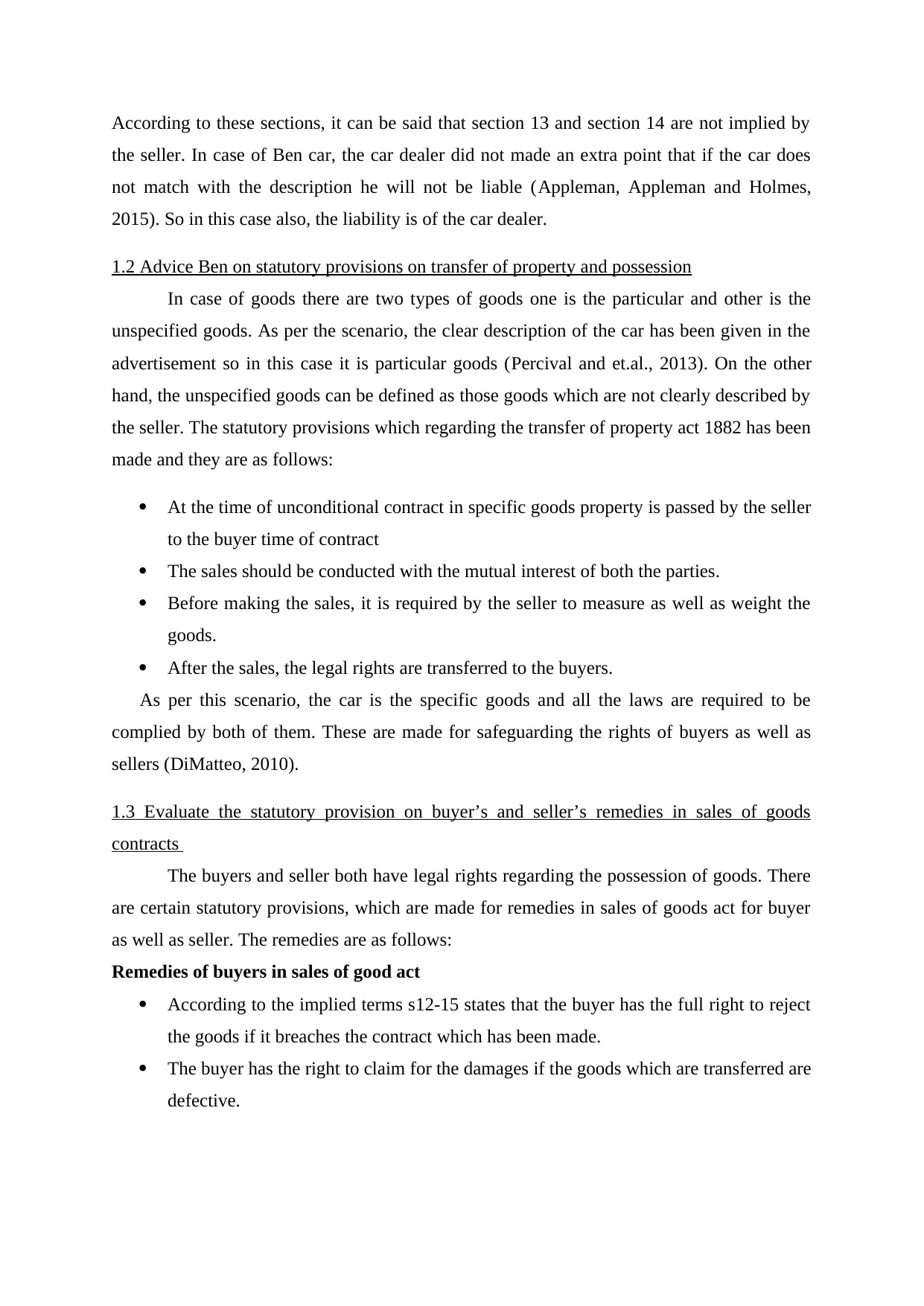
According to these sections, it can be said that section 13 and section 14 are not implied by
the seller. In case of Ben car, the car dealer did not made an extra point that if the car does
not match with the description he will not be liable (Appleman, Appleman and Holmes,
2015). So in this case also, the liability is of the car dealer.
1.2 Advice Ben on statutory provisions on transfer of property and possession
In case of goods there are two types of goods one is the particular and other is the
unspecified goods. As per the scenario, the clear description of the car has been given in the
advertisement so in this case it is particular goods (Percival and et.al., 2013). On the other
hand, the unspecified goods can be defined as those goods which are not clearly described by
the seller. The statutory provisions which regarding the transfer of property act 1882 has been
made and they are as follows:
At the time of unconditional contract in specific goods property is passed by the seller
to the buyer time of contract
The sales should be conducted with the mutual interest of both the parties.
Before making the sales, it is required by the seller to measure as well as weight the
goods.
After the sales, the legal rights are transferred to the buyers.
As per this scenario, the car is the specific goods and all the laws are required to be
complied by both of them. These are made for safeguarding the rights of buyers as well as
sellers (DiMatteo, 2010).
1.3 Evaluate the statutory provision on buyer’s and seller’s remedies in sales of goods
contracts
The buyers and seller both have legal rights regarding the possession of goods. There
are certain statutory provisions, which are made for remedies in sales of goods act for buyer
as well as seller. The remedies are as follows:
Remedies of buyers in sales of good act
According to the implied terms s12-15 states that the buyer has the full right to reject
the goods if it breaches the contract which has been made.
The buyer has the right to claim for the damages if the goods which are transferred are
defective.
the seller. In case of Ben car, the car dealer did not made an extra point that if the car does
not match with the description he will not be liable (Appleman, Appleman and Holmes,
2015). So in this case also, the liability is of the car dealer.
1.2 Advice Ben on statutory provisions on transfer of property and possession
In case of goods there are two types of goods one is the particular and other is the
unspecified goods. As per the scenario, the clear description of the car has been given in the
advertisement so in this case it is particular goods (Percival and et.al., 2013). On the other
hand, the unspecified goods can be defined as those goods which are not clearly described by
the seller. The statutory provisions which regarding the transfer of property act 1882 has been
made and they are as follows:
At the time of unconditional contract in specific goods property is passed by the seller
to the buyer time of contract
The sales should be conducted with the mutual interest of both the parties.
Before making the sales, it is required by the seller to measure as well as weight the
goods.
After the sales, the legal rights are transferred to the buyers.
As per this scenario, the car is the specific goods and all the laws are required to be
complied by both of them. These are made for safeguarding the rights of buyers as well as
sellers (DiMatteo, 2010).
1.3 Evaluate the statutory provision on buyer’s and seller’s remedies in sales of goods
contracts
The buyers and seller both have legal rights regarding the possession of goods. There
are certain statutory provisions, which are made for remedies in sales of goods act for buyer
as well as seller. The remedies are as follows:
Remedies of buyers in sales of good act
According to the implied terms s12-15 states that the buyer has the full right to reject
the goods if it breaches the contract which has been made.
The buyer has the right to claim for the damages if the goods which are transferred are
defective.
Paraphrase This Document
Need a fresh take? Get an instant paraphrase of this document with our AI Paraphraser
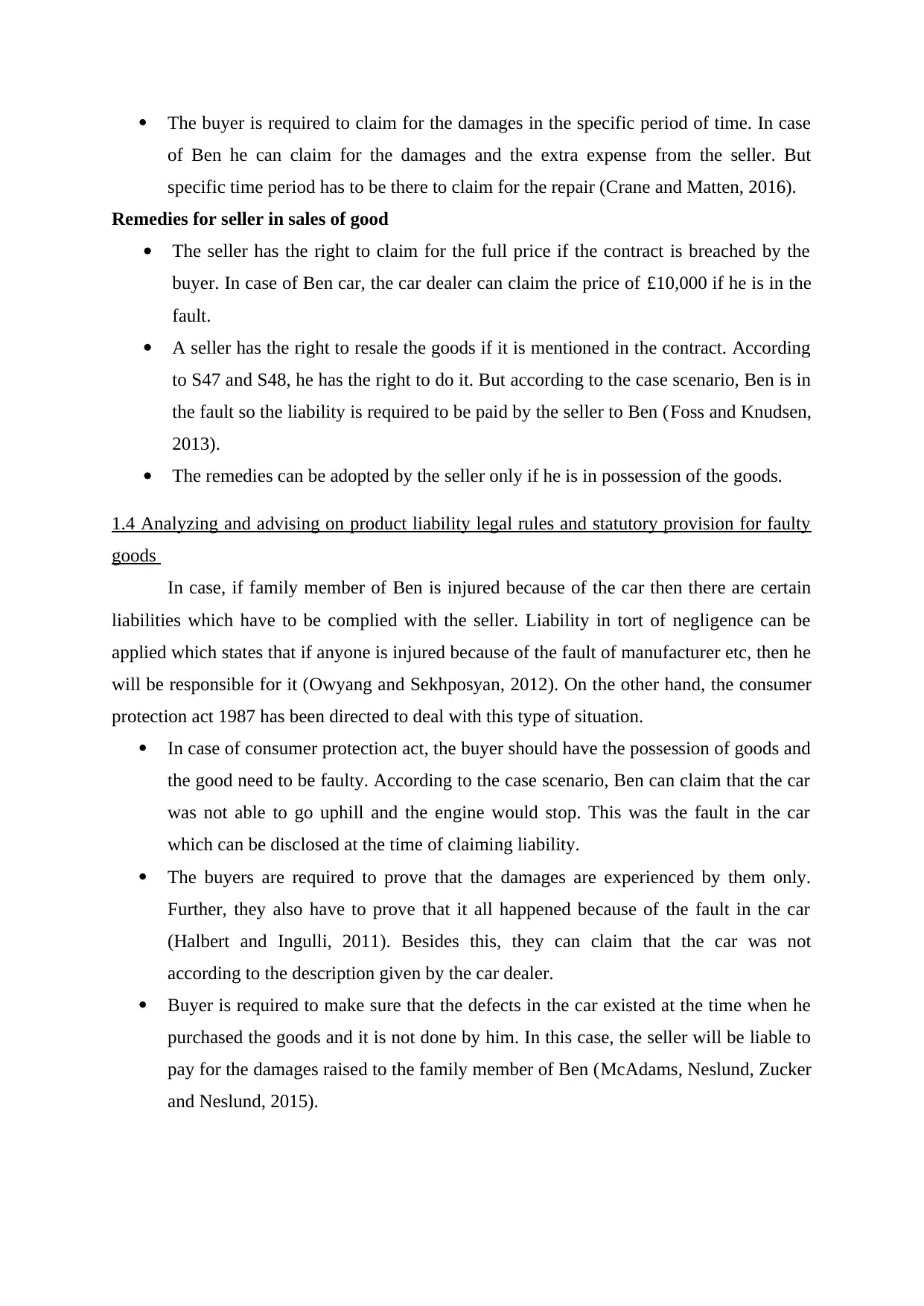
The buyer is required to claim for the damages in the specific period of time. In case
of Ben he can claim for the damages and the extra expense from the seller. But
specific time period has to be there to claim for the repair (Crane and Matten, 2016).
Remedies for seller in sales of good
The seller has the right to claim for the full price if the contract is breached by the
buyer. In case of Ben car, the car dealer can claim the price of £10,000 if he is in the
fault.
A seller has the right to resale the goods if it is mentioned in the contract. According
to S47 and S48, he has the right to do it. But according to the case scenario, Ben is in
the fault so the liability is required to be paid by the seller to Ben (Foss and Knudsen,
2013).
The remedies can be adopted by the seller only if he is in possession of the goods.
1.4 Analyzing and advising on product liability legal rules and statutory provision for faulty
goods
In case, if family member of Ben is injured because of the car then there are certain
liabilities which have to be complied with the seller. Liability in tort of negligence can be
applied which states that if anyone is injured because of the fault of manufacturer etc, then he
will be responsible for it (Owyang and Sekhposyan, 2012). On the other hand, the consumer
protection act 1987 has been directed to deal with this type of situation.
In case of consumer protection act, the buyer should have the possession of goods and
the good need to be faulty. According to the case scenario, Ben can claim that the car
was not able to go uphill and the engine would stop. This was the fault in the car
which can be disclosed at the time of claiming liability.
The buyers are required to prove that the damages are experienced by them only.
Further, they also have to prove that it all happened because of the fault in the car
(Halbert and Ingulli, 2011). Besides this, they can claim that the car was not
according to the description given by the car dealer.
Buyer is required to make sure that the defects in the car existed at the time when he
purchased the goods and it is not done by him. In this case, the seller will be liable to
pay for the damages raised to the family member of Ben (McAdams, Neslund, Zucker
and Neslund, 2015).
of Ben he can claim for the damages and the extra expense from the seller. But
specific time period has to be there to claim for the repair (Crane and Matten, 2016).
Remedies for seller in sales of good
The seller has the right to claim for the full price if the contract is breached by the
buyer. In case of Ben car, the car dealer can claim the price of £10,000 if he is in the
fault.
A seller has the right to resale the goods if it is mentioned in the contract. According
to S47 and S48, he has the right to do it. But according to the case scenario, Ben is in
the fault so the liability is required to be paid by the seller to Ben (Foss and Knudsen,
2013).
The remedies can be adopted by the seller only if he is in possession of the goods.
1.4 Analyzing and advising on product liability legal rules and statutory provision for faulty
goods
In case, if family member of Ben is injured because of the car then there are certain
liabilities which have to be complied with the seller. Liability in tort of negligence can be
applied which states that if anyone is injured because of the fault of manufacturer etc, then he
will be responsible for it (Owyang and Sekhposyan, 2012). On the other hand, the consumer
protection act 1987 has been directed to deal with this type of situation.
In case of consumer protection act, the buyer should have the possession of goods and
the good need to be faulty. According to the case scenario, Ben can claim that the car
was not able to go uphill and the engine would stop. This was the fault in the car
which can be disclosed at the time of claiming liability.
The buyers are required to prove that the damages are experienced by them only.
Further, they also have to prove that it all happened because of the fault in the car
(Halbert and Ingulli, 2011). Besides this, they can claim that the car was not
according to the description given by the car dealer.
Buyer is required to make sure that the defects in the car existed at the time when he
purchased the goods and it is not done by him. In this case, the seller will be liable to
pay for the damages raised to the family member of Ben (McAdams, Neslund, Zucker
and Neslund, 2015).
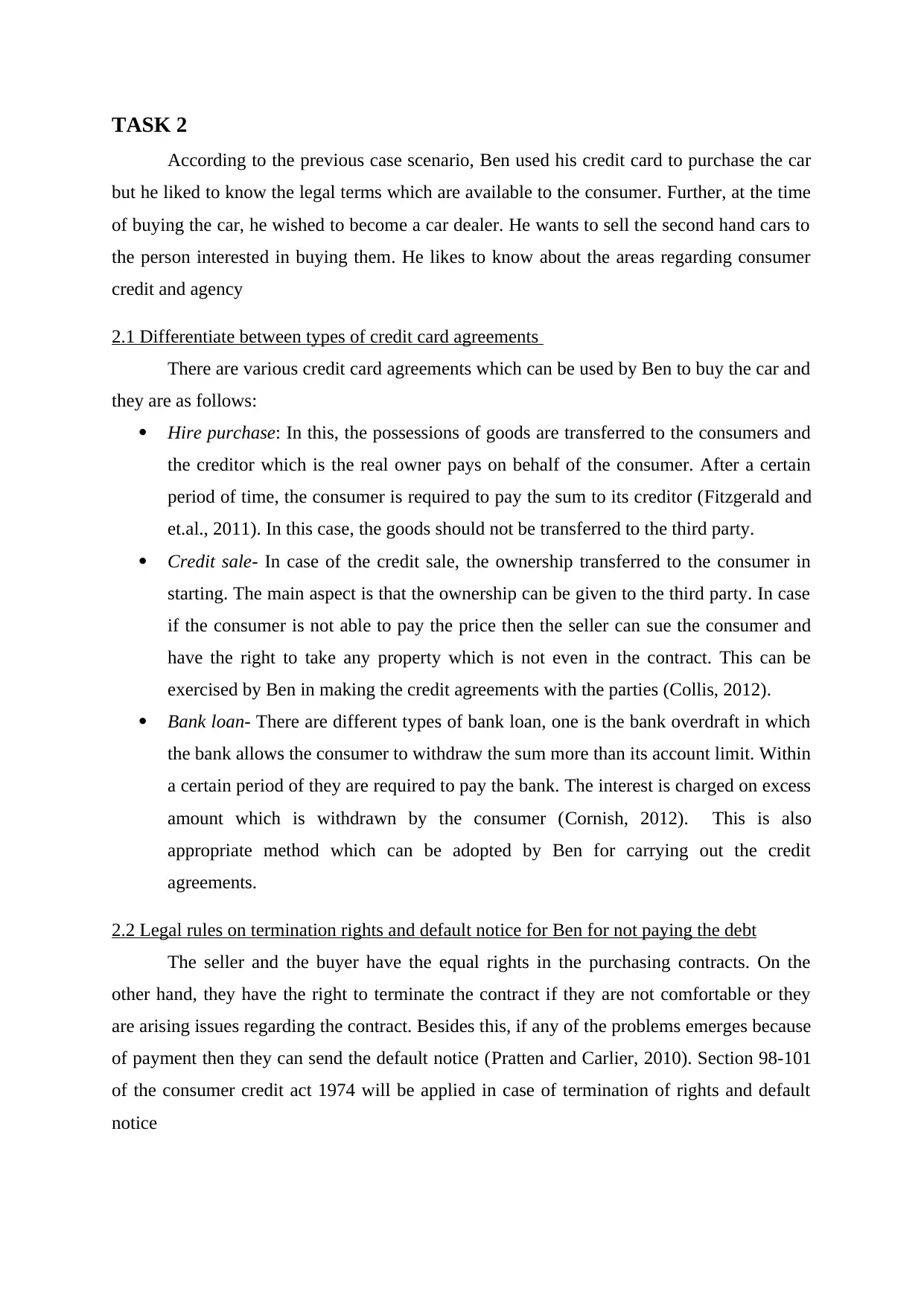
TASK 2
According to the previous case scenario, Ben used his credit card to purchase the car
but he liked to know the legal terms which are available to the consumer. Further, at the time
of buying the car, he wished to become a car dealer. He wants to sell the second hand cars to
the person interested in buying them. He likes to know about the areas regarding consumer
credit and agency
2.1 Differentiate between types of credit card agreements
There are various credit card agreements which can be used by Ben to buy the car and
they are as follows:
Hire purchase: In this, the possessions of goods are transferred to the consumers and
the creditor which is the real owner pays on behalf of the consumer. After a certain
period of time, the consumer is required to pay the sum to its creditor (Fitzgerald and
et.al., 2011). In this case, the goods should not be transferred to the third party.
Credit sale- In case of the credit sale, the ownership transferred to the consumer in
starting. The main aspect is that the ownership can be given to the third party. In case
if the consumer is not able to pay the price then the seller can sue the consumer and
have the right to take any property which is not even in the contract. This can be
exercised by Ben in making the credit agreements with the parties (Collis, 2012).
Bank loan- There are different types of bank loan, one is the bank overdraft in which
the bank allows the consumer to withdraw the sum more than its account limit. Within
a certain period of they are required to pay the bank. The interest is charged on excess
amount which is withdrawn by the consumer (Cornish, 2012). This is also
appropriate method which can be adopted by Ben for carrying out the credit
agreements.
2.2 Legal rules on termination rights and default notice for Ben for not paying the debt
The seller and the buyer have the equal rights in the purchasing contracts. On the
other hand, they have the right to terminate the contract if they are not comfortable or they
are arising issues regarding the contract. Besides this, if any of the problems emerges because
of payment then they can send the default notice (Pratten and Carlier, 2010). Section 98-101
of the consumer credit act 1974 will be applied in case of termination of rights and default
notice
According to the previous case scenario, Ben used his credit card to purchase the car
but he liked to know the legal terms which are available to the consumer. Further, at the time
of buying the car, he wished to become a car dealer. He wants to sell the second hand cars to
the person interested in buying them. He likes to know about the areas regarding consumer
credit and agency
2.1 Differentiate between types of credit card agreements
There are various credit card agreements which can be used by Ben to buy the car and
they are as follows:
Hire purchase: In this, the possessions of goods are transferred to the consumers and
the creditor which is the real owner pays on behalf of the consumer. After a certain
period of time, the consumer is required to pay the sum to its creditor (Fitzgerald and
et.al., 2011). In this case, the goods should not be transferred to the third party.
Credit sale- In case of the credit sale, the ownership transferred to the consumer in
starting. The main aspect is that the ownership can be given to the third party. In case
if the consumer is not able to pay the price then the seller can sue the consumer and
have the right to take any property which is not even in the contract. This can be
exercised by Ben in making the credit agreements with the parties (Collis, 2012).
Bank loan- There are different types of bank loan, one is the bank overdraft in which
the bank allows the consumer to withdraw the sum more than its account limit. Within
a certain period of they are required to pay the bank. The interest is charged on excess
amount which is withdrawn by the consumer (Cornish, 2012). This is also
appropriate method which can be adopted by Ben for carrying out the credit
agreements.
2.2 Legal rules on termination rights and default notice for Ben for not paying the debt
The seller and the buyer have the equal rights in the purchasing contracts. On the
other hand, they have the right to terminate the contract if they are not comfortable or they
are arising issues regarding the contract. Besides this, if any of the problems emerges because
of payment then they can send the default notice (Pratten and Carlier, 2010). Section 98-101
of the consumer credit act 1974 will be applied in case of termination of rights and default
notice
⊘ This is a preview!⊘
Do you want full access?
Subscribe today to unlock all pages.

Trusted by 1+ million students worldwide
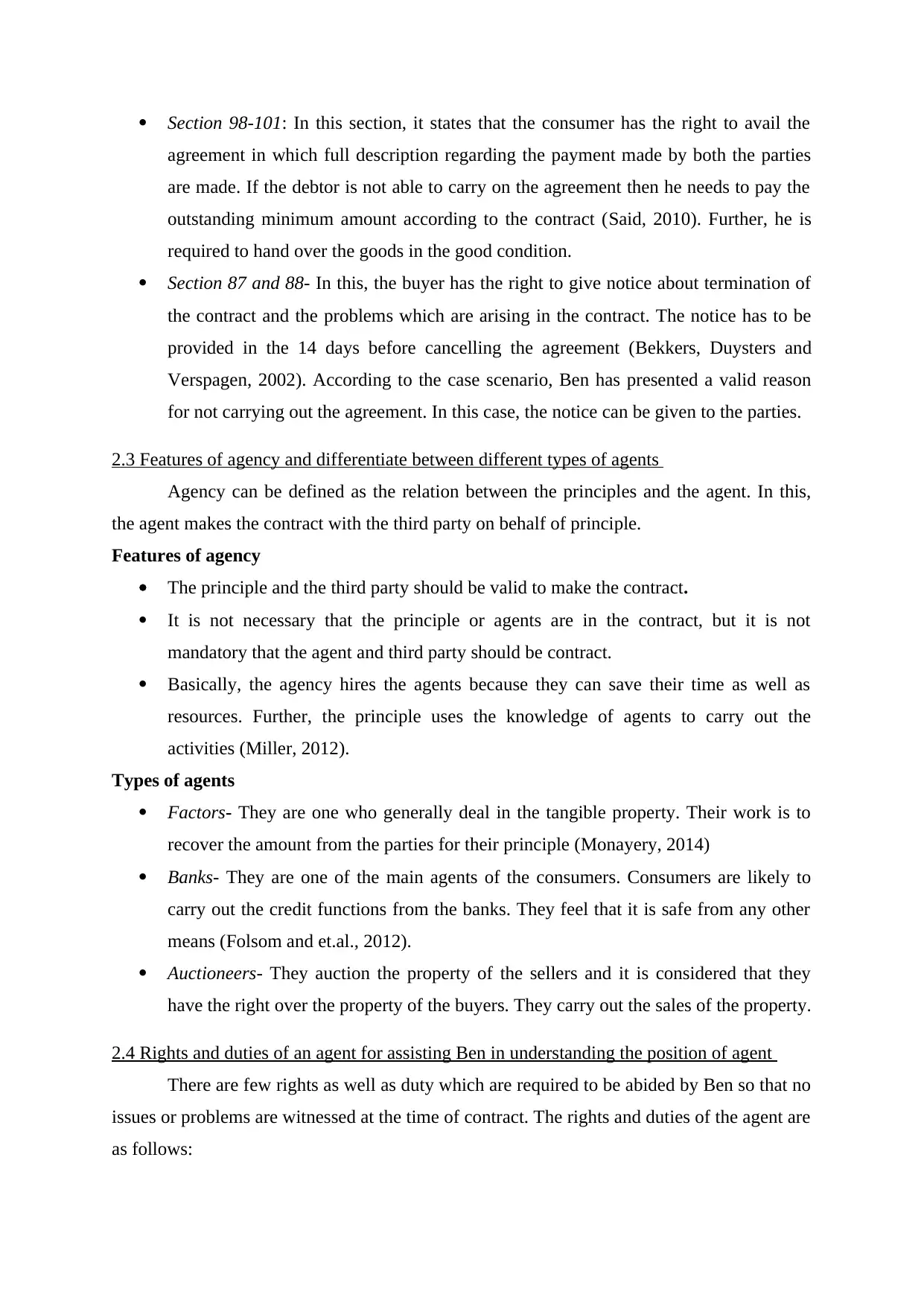
Section 98-101: In this section, it states that the consumer has the right to avail the
agreement in which full description regarding the payment made by both the parties
are made. If the debtor is not able to carry on the agreement then he needs to pay the
outstanding minimum amount according to the contract (Said, 2010). Further, he is
required to hand over the goods in the good condition.
Section 87 and 88- In this, the buyer has the right to give notice about termination of
the contract and the problems which are arising in the contract. The notice has to be
provided in the 14 days before cancelling the agreement (Bekkers, Duysters and
Verspagen, 2002). According to the case scenario, Ben has presented a valid reason
for not carrying out the agreement. In this case, the notice can be given to the parties.
2.3 Features of agency and differentiate between different types of agents
Agency can be defined as the relation between the principles and the agent. In this,
the agent makes the contract with the third party on behalf of principle.
Features of agency
The principle and the third party should be valid to make the contract.
It is not necessary that the principle or agents are in the contract, but it is not
mandatory that the agent and third party should be contract.
Basically, the agency hires the agents because they can save their time as well as
resources. Further, the principle uses the knowledge of agents to carry out the
activities (Miller, 2012).
Types of agents
Factors- They are one who generally deal in the tangible property. Their work is to
recover the amount from the parties for their principle (Monayery, 2014)
Banks- They are one of the main agents of the consumers. Consumers are likely to
carry out the credit functions from the banks. They feel that it is safe from any other
means (Folsom and et.al., 2012).
Auctioneers- They auction the property of the sellers and it is considered that they
have the right over the property of the buyers. They carry out the sales of the property.
2.4 Rights and duties of an agent for assisting Ben in understanding the position of agent
There are few rights as well as duty which are required to be abided by Ben so that no
issues or problems are witnessed at the time of contract. The rights and duties of the agent are
as follows:
agreement in which full description regarding the payment made by both the parties
are made. If the debtor is not able to carry on the agreement then he needs to pay the
outstanding minimum amount according to the contract (Said, 2010). Further, he is
required to hand over the goods in the good condition.
Section 87 and 88- In this, the buyer has the right to give notice about termination of
the contract and the problems which are arising in the contract. The notice has to be
provided in the 14 days before cancelling the agreement (Bekkers, Duysters and
Verspagen, 2002). According to the case scenario, Ben has presented a valid reason
for not carrying out the agreement. In this case, the notice can be given to the parties.
2.3 Features of agency and differentiate between different types of agents
Agency can be defined as the relation between the principles and the agent. In this,
the agent makes the contract with the third party on behalf of principle.
Features of agency
The principle and the third party should be valid to make the contract.
It is not necessary that the principle or agents are in the contract, but it is not
mandatory that the agent and third party should be contract.
Basically, the agency hires the agents because they can save their time as well as
resources. Further, the principle uses the knowledge of agents to carry out the
activities (Miller, 2012).
Types of agents
Factors- They are one who generally deal in the tangible property. Their work is to
recover the amount from the parties for their principle (Monayery, 2014)
Banks- They are one of the main agents of the consumers. Consumers are likely to
carry out the credit functions from the banks. They feel that it is safe from any other
means (Folsom and et.al., 2012).
Auctioneers- They auction the property of the sellers and it is considered that they
have the right over the property of the buyers. They carry out the sales of the property.
2.4 Rights and duties of an agent for assisting Ben in understanding the position of agent
There are few rights as well as duty which are required to be abided by Ben so that no
issues or problems are witnessed at the time of contract. The rights and duties of the agent are
as follows:
Paraphrase This Document
Need a fresh take? Get an instant paraphrase of this document with our AI Paraphraser
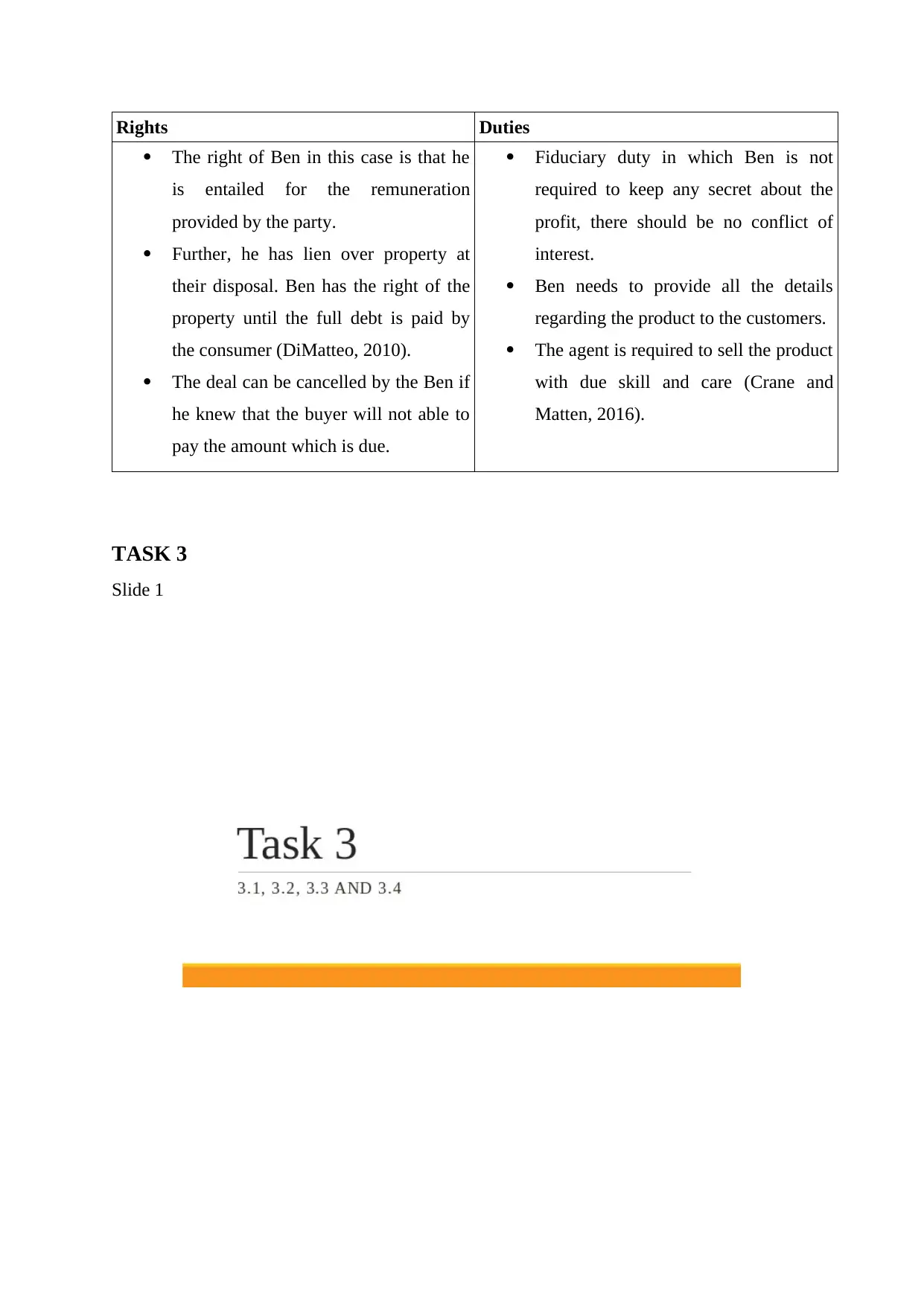
Rights Duties
The right of Ben in this case is that he
is entailed for the remuneration
provided by the party.
Further, he has lien over property at
their disposal. Ben has the right of the
property until the full debt is paid by
the consumer (DiMatteo, 2010).
The deal can be cancelled by the Ben if
he knew that the buyer will not able to
pay the amount which is due.
Fiduciary duty in which Ben is not
required to keep any secret about the
profit, there should be no conflict of
interest.
Ben needs to provide all the details
regarding the product to the customers.
The agent is required to sell the product
with due skill and care (Crane and
Matten, 2016).
TASK 3
Slide 1
The right of Ben in this case is that he
is entailed for the remuneration
provided by the party.
Further, he has lien over property at
their disposal. Ben has the right of the
property until the full debt is paid by
the consumer (DiMatteo, 2010).
The deal can be cancelled by the Ben if
he knew that the buyer will not able to
pay the amount which is due.
Fiduciary duty in which Ben is not
required to keep any secret about the
profit, there should be no conflict of
interest.
Ben needs to provide all the details
regarding the product to the customers.
The agent is required to sell the product
with due skill and care (Crane and
Matten, 2016).
TASK 3
Slide 1
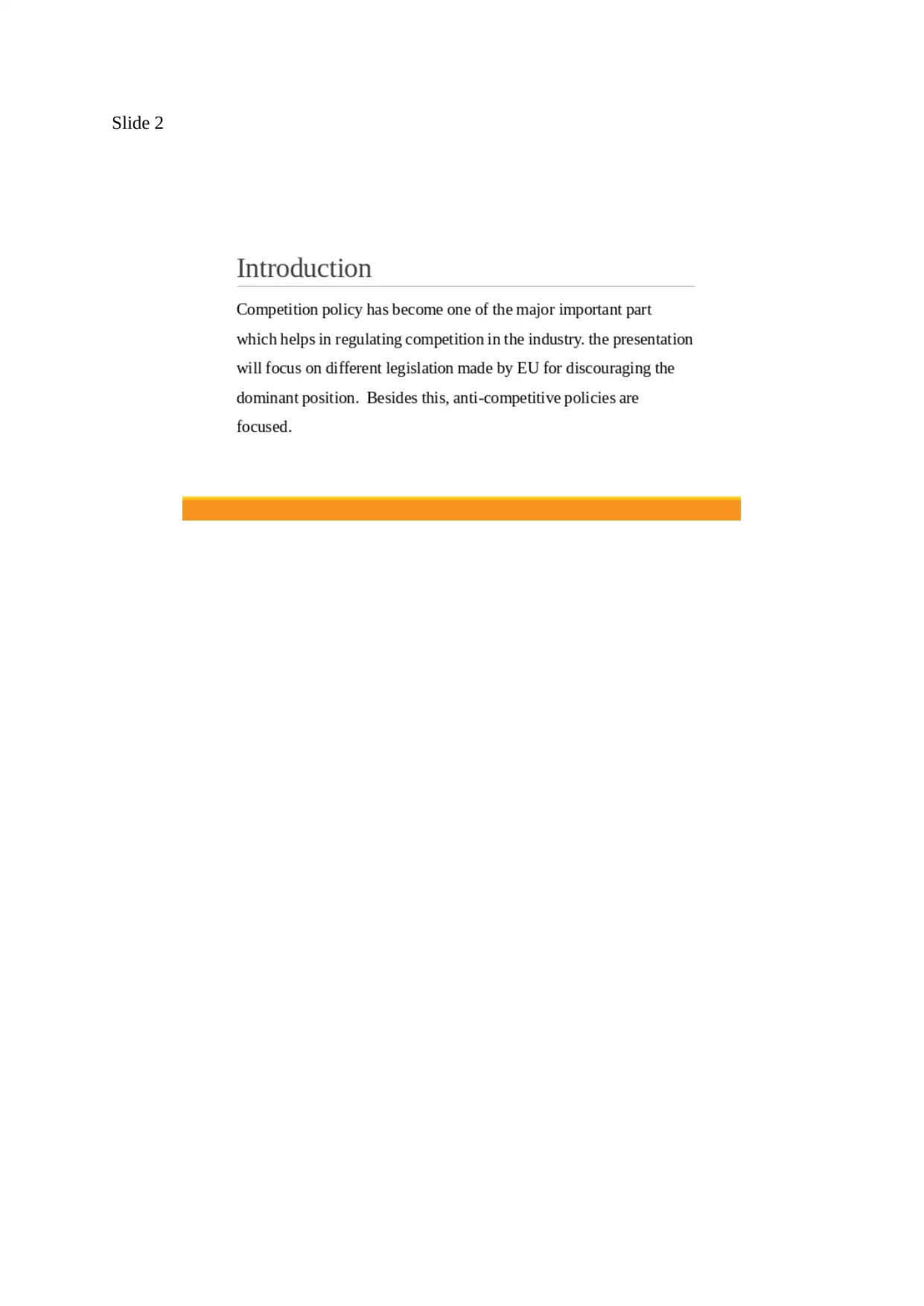
Slide 2
⊘ This is a preview!⊘
Do you want full access?
Subscribe today to unlock all pages.

Trusted by 1+ million students worldwide
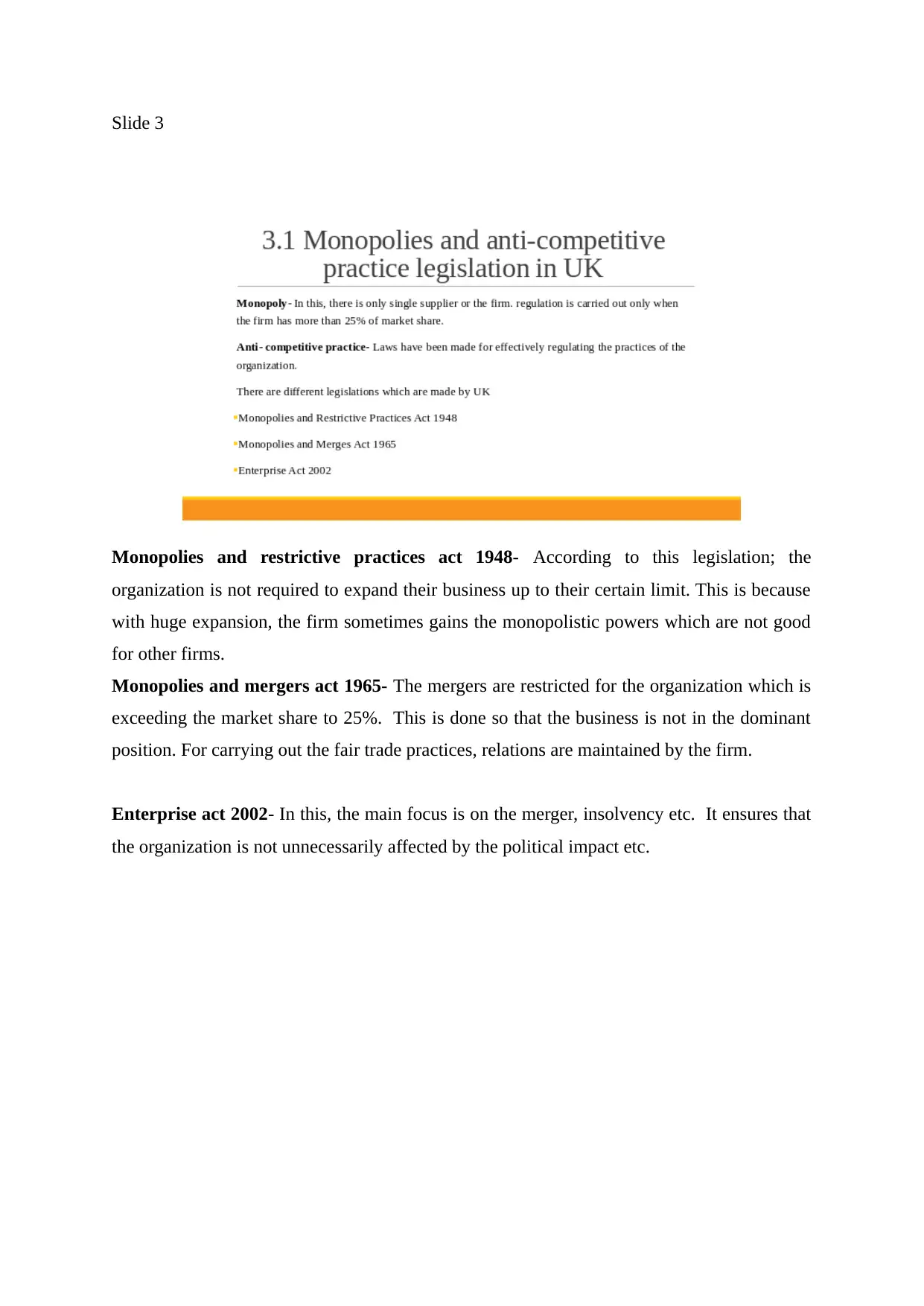
Slide 3
Monopolies and restrictive practices act 1948- According to this legislation; the
organization is not required to expand their business up to their certain limit. This is because
with huge expansion, the firm sometimes gains the monopolistic powers which are not good
for other firms.
Monopolies and mergers act 1965- The mergers are restricted for the organization which is
exceeding the market share to 25%. This is done so that the business is not in the dominant
position. For carrying out the fair trade practices, relations are maintained by the firm.
Enterprise act 2002- In this, the main focus is on the merger, insolvency etc. It ensures that
the organization is not unnecessarily affected by the political impact etc.
Monopolies and restrictive practices act 1948- According to this legislation; the
organization is not required to expand their business up to their certain limit. This is because
with huge expansion, the firm sometimes gains the monopolistic powers which are not good
for other firms.
Monopolies and mergers act 1965- The mergers are restricted for the organization which is
exceeding the market share to 25%. This is done so that the business is not in the dominant
position. For carrying out the fair trade practices, relations are maintained by the firm.
Enterprise act 2002- In this, the main focus is on the merger, insolvency etc. It ensures that
the organization is not unnecessarily affected by the political impact etc.
Paraphrase This Document
Need a fresh take? Get an instant paraphrase of this document with our AI Paraphraser
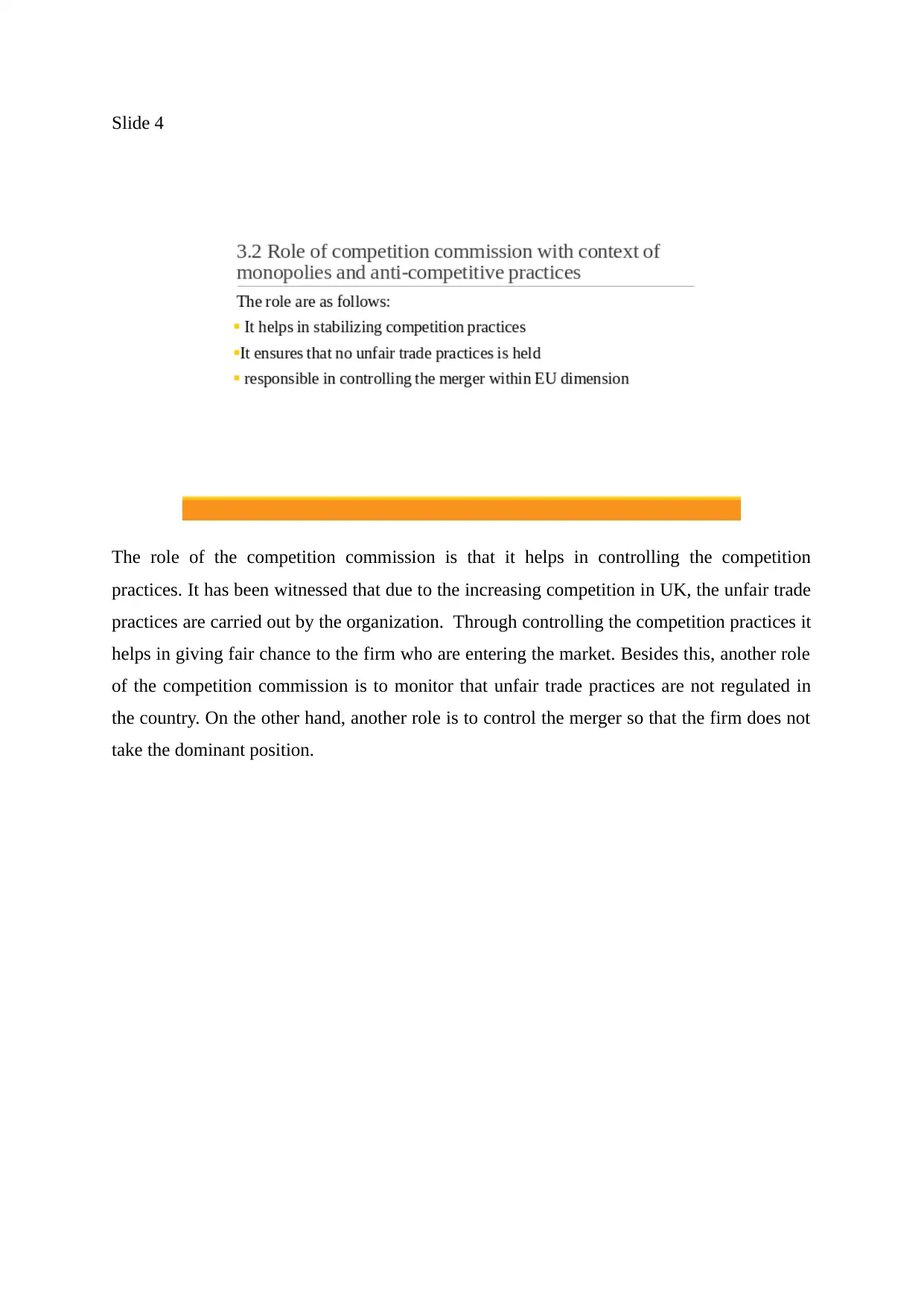
Slide 4
The role of the competition commission is that it helps in controlling the competition
practices. It has been witnessed that due to the increasing competition in UK, the unfair trade
practices are carried out by the organization. Through controlling the competition practices it
helps in giving fair chance to the firm who are entering the market. Besides this, another role
of the competition commission is to monitor that unfair trade practices are not regulated in
the country. On the other hand, another role is to control the merger so that the firm does not
take the dominant position.
The role of the competition commission is that it helps in controlling the competition
practices. It has been witnessed that due to the increasing competition in UK, the unfair trade
practices are carried out by the organization. Through controlling the competition practices it
helps in giving fair chance to the firm who are entering the market. Besides this, another role
of the competition commission is to monitor that unfair trade practices are not regulated in
the country. On the other hand, another role is to control the merger so that the firm does not
take the dominant position.
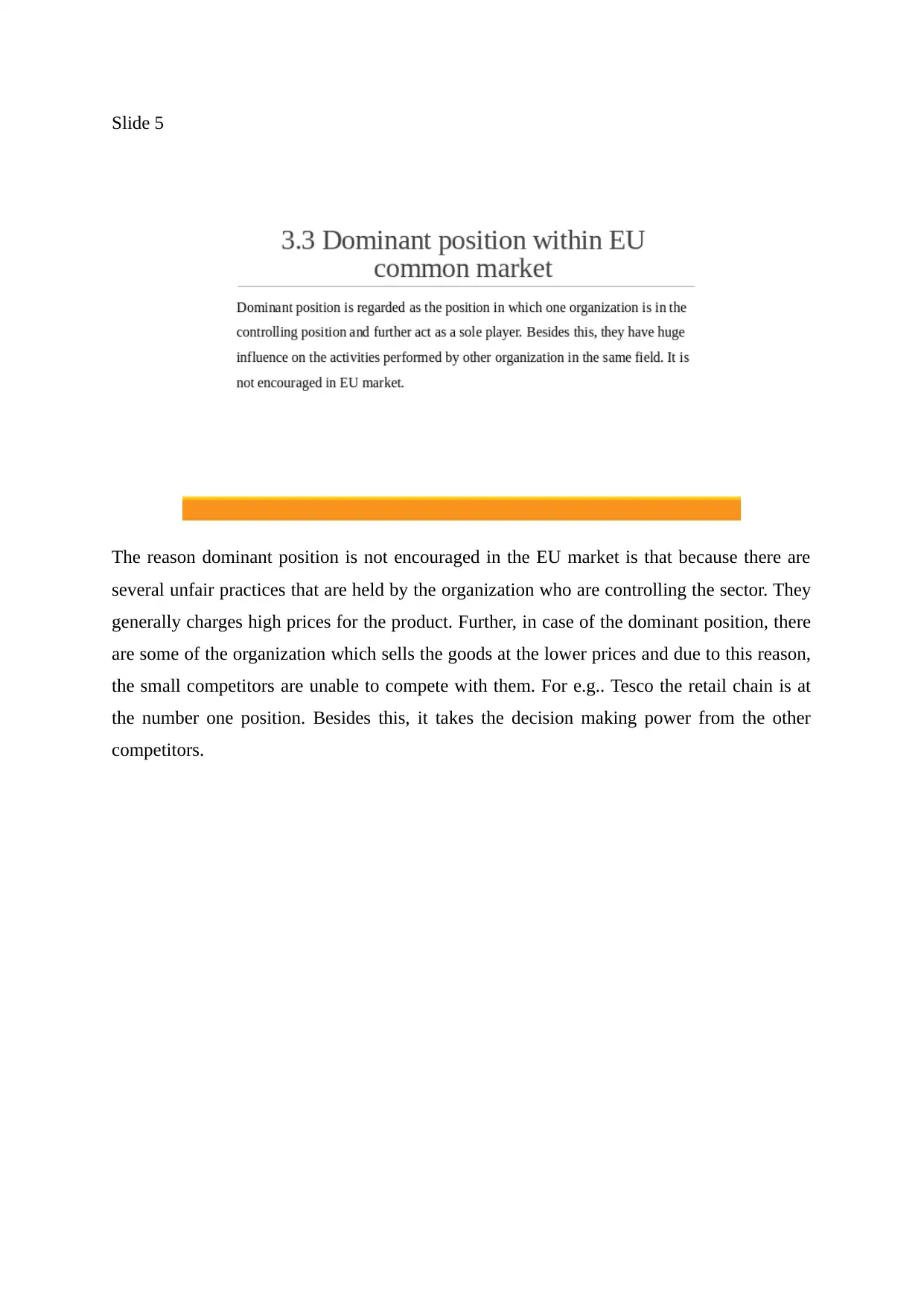
Slide 5
The reason dominant position is not encouraged in the EU market is that because there are
several unfair practices that are held by the organization who are controlling the sector. They
generally charges high prices for the product. Further, in case of the dominant position, there
are some of the organization which sells the goods at the lower prices and due to this reason,
the small competitors are unable to compete with them. For e.g.. Tesco the retail chain is at
the number one position. Besides this, it takes the decision making power from the other
competitors.
The reason dominant position is not encouraged in the EU market is that because there are
several unfair practices that are held by the organization who are controlling the sector. They
generally charges high prices for the product. Further, in case of the dominant position, there
are some of the organization which sells the goods at the lower prices and due to this reason,
the small competitors are unable to compete with them. For e.g.. Tesco the retail chain is at
the number one position. Besides this, it takes the decision making power from the other
competitors.
⊘ This is a preview!⊘
Do you want full access?
Subscribe today to unlock all pages.

Trusted by 1+ million students worldwide
1 out of 20
Related Documents
Your All-in-One AI-Powered Toolkit for Academic Success.
+13062052269
info@desklib.com
Available 24*7 on WhatsApp / Email
![[object Object]](/_next/static/media/star-bottom.7253800d.svg)
Unlock your academic potential
Copyright © 2020–2026 A2Z Services. All Rights Reserved. Developed and managed by ZUCOL.





